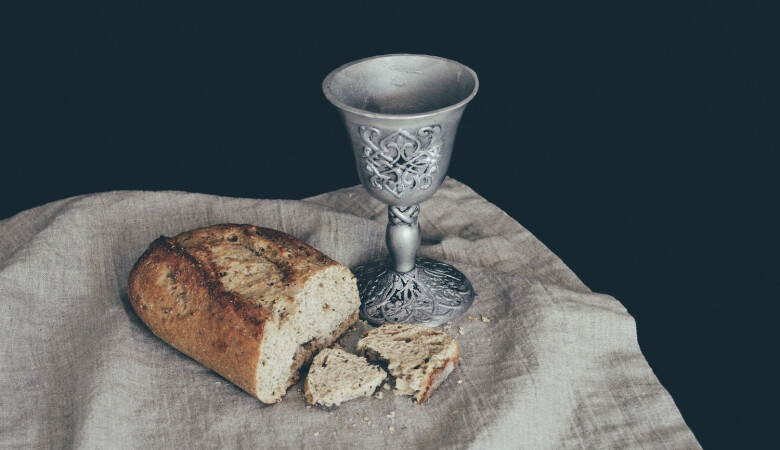God’s Holy Gifts: Singleness and Marriage (1 Corinthians Sermon 23)
March 24, 2019 | Andy Davis
1 Corinthians 7:1-9
Marriage and Parenting
The Perfect Holiness of God
So turn in your Bibles to 1 Corinthians chapter 7. We continue in our study in this incredible epistle. This morning as I was having my quiet time, I'm in the section and Deuteronomy where Moses begged to have the sentence that God had put on him, that he would not cross over the Jordan River and enter the Promised Land, because he had sinned in the matter of the rock and the water flowing from the rock, and God would not remove his sentence that he would not be permitted to cross the Jordan River. But how He had promised and at the end of the Book of Deuteronomy, He would give him the final and majestic vision of all the many, many visions that He showed Moses. He would allow him to see that good land from the top of Mount Pisgah. It was the final of a series of really astonishing visions, sights, if you could put it that way, that God showed Moses. Think of the life of Moses, think of all the things He showed him, think of Mount Sinai where God descended in fire on that mountain. And Moses saw it and actually was invited up into the mountain and to see manifestations of Almighty God. What an incredible vision that was.
Or before that, the Red Sea crossing. What a spectacular vision or sight of the power of God. Think about the ten plagues culminating in the plague on the first born and the things that Moses saw with his own eyes and displays of God's power over nature, the way he turned the water of Egypt into blood and the way all those plagues came. And Moses saw it. Supernatural displays are the power of God. But what really hit me this morning as I was thinking about the text I'm about to preach on was the first supernatural sign that Moses saw. And that was when he was an 80-year-old man and he was tending his father-in-law Jethro's sheep on the back side of the desert and he suddenly saw something he couldn't explain. And that was a bush that was consumed by fire, but not consumed. It was not burned up. And he thought this was remarkable. This is something he can't explain. And I think the spiritual reality behind the burning bush may be the most significant of all of the amazing things Moses ever saw. Because it represents how Almighty God, this perfect, holy God can dwell in the midst of sinners like us.
As it says in Isaiah 33:14, the sinners in Zion are gripped with trembling saying who of us can dwell with everlasting burning? Who of us can dwell with a consuming fire? And so as we have learned who we are, how sinful we are, how corrupt and how holy God is... And that education has only begun. It's going to go on for all eternity. We will understand just how holy and pure God is and how God said in Habakkuk, his eyes are too pure to look on evil. He cannot tolerate wrong. This is a Holy God and we are corrupting our sin, and how can this fire dwell in the midst of such a combustible people as us? But He will. He'll spend all eternity in our midst. We're going to see Him face-to-face. What we have only heard about now with our ears, we will see with our eyes. We will see the glory of God and we will not be consumed by it. We will look on it. With our resurrection eyes, we will look on perfect glory, the glory of God. We will see it for all eternity and we will not be burned up. We will be in the midst of the consuming fire, and we will bask in it and delight in it. And we have now a foretaste of that future through the indwelling Holy Spirit of God.
In the end of 1 Corinthians 6, there are these remarkable words. Look again at what we looked at last week. 1 Corinthian 6:19, it says, "Do you not know that your body is a temple of the Holy Spirit who is in you, whom you have received from God?" Now, I tell you, there's not a person in this room that does not underestimate that statement. The Holy Spirit of God... If you're a Christian, the Holy Spirit of God is dwelling in you like the burning bush. And if you've been at sanctification any length of time, you know how combustible you are. You know how much it is true, like it says in Romans 7, the very thing I hate, I do and the thing that I want to do and that I love, I do not do. That's combustible. And yet this holy God dwells in our midst. The Holy Spirit is in you and that is the consummation of the promise of God. Christ in you, the hope of glory. So what that means is someday, we will be done with sin. Amen, hallelujah. We'll be done with it. Not just sexual sin, we'll be done with all sin. And what that means is that all of the commands of God and all of His... The intentions of God will be consummated in us, the holy people of God.
And so as we go over now into 1 Corinthians 7, we need to be reminded that the Holy Spirit is in us as a deposit guaranteeing our future inheritance, but He's also in us as a power source to make us holy. And there may be no topic in which we feel the need for that as much as sexuality, as much as the attractions of the heart, the relationships of love. We know that not just from scripture, but just from culture, from love songs, from anything, what a powerful force love is, sexual attraction is. It's a powerful force. And so we need to hear from God today. We need God to speak to us and to talk to us some more in 1 Corinthian 7.
I. God’s Beautiful Provision of Marriage
And so we begin as we transition now from chapter 6 into chapter 7 with a whole chapter on the practicalities of marriage, God's provision for marriage. And this beautiful provision of marriage Jesus Christ said was established at the beginning. When he was asked in Matthew 19 about divorce, "Is it lawful for a man to divorce his wife for any and every reason?" Jesus brought his inquisitors to scripture and said, "Haven't you read…at the beginning, the Creator made them male and female, [quoting Genesis 1] and said, 'For this reason, a man will leave his father and mother and be united to his wife, and the two will become one flesh'? So they are no longer two, but one. Therefore, what God has joined together, let man not separate." So we answer the question about divorce by talking about marriage. And so God established in Adam and Eve a lasting pattern of provision for marriage. And it's a marvelous provision, it's a marvelous pattern for marriage.
God’s Delightful Purposes in Marriage
And I want to just begin this message here as we begin this whole chapter on looking at marriage and singleness, we're seeing what a beautiful provision this is, how God... What God intended in marriage. And so I've got seven concepts. They all happen to begin with the letter P. I don't know how that happened, just one after the other... Just happened that way. If you believe that, talk to me afterwards. We'll discuss homiletics. But seven purposes, God's purpose in marriage.
1) Partnership
First, partnership. God said in Genesis 2:18, "It is not good for the man to be alone. I will make a helper suitable for him." Adam was alone in a way no human being since that time has been alone, completely alone. There was no other human being on Earth, he was completely alone. And it was not good for the man to continue alone, it certainly was good for him to be alone for a while because that's what God did. And He did it, I think, to establish the primacy of the husband in the marriage relationship, but also to make him feel acutely the desire for a helper suitable for him. And so God said, I will craft a helper suitable for him.
It's a beautiful word, the word helper. And the word suitable means perfectly aligned to him, corresponding to him equally in the image of God, able to share in conversations, dreams, goals in relationship, a partnership, a friendship patterned after the trinity. The Father, the Son, the Spirit in some mysterious way, separate persons perfectly one. Something we will never fully comprehend. But all human relationships are in some sense patterned after the trinity, the oneness. And so the two shall become one. One means individuals but thinking the same thoughts, having the same goals, having the same love, having the same purpose. Oneness, partnership, friendship.
2) Pleasure
Secondly, pleasure. God created marriage for pleasure. Going to the text that Jesus quoted, Genesis 2:24-25. It says, "For this reason, a man will leave his father and mother and be united to his wife, and they will become one flesh." One flesh. And then the next verse, "The man and his wife were both naked and they felt no shame."
So I think we all know what that's talking about, marital relations, or sex. The Song of Songs celebrates the pleasure that comes from a holy sexual relationship between a husband and wife, something that God created, something that God intended. It is one of the greatest pleasures there is in this world and God made marriage in part for that pleasure. The pleasure is so great that it seems, in terms of language, only poetry can really capture it and so there's this whole book of poetry, Song of Solomon, or Song of Songs, that is dedicated to the delights of married love. Some of you are sweating a little bit here as I'm about to quote, but I've selected proper quotes here from Song of Songs. You can read the whole book on your own. But Song of Solomon, or Song of Songs 8:6-7 it says this, "Place me like a seal over your heart, like a seal on your arm, for love is as strong as death and it's jealousy unyielding as the grave. It burns like blazing fire, like a mighty flame. Many waters cannot quench love, rivers cannot wash it away." So that's the intensity and, if we could just say, pleasure that comes in a healthy marriage, even physically.
3) Procreation
Thirdly, procreation. God intended marriage for the sake of procreation, that there would be a multitude greater than anyone could count from every tribe, language, people, and nation, standing around the throne worshipping God for salvation. Where would all that come from? God intended that Adam not stay alone, that Adam and Eve not be childless, but he intended that they be fruitful and multiply and fill the Earth. And so He commanded them to do it and He blessed them. It's a blessing that He's given them. Malachi 2:15 says, "Has not the Lord made them one? In flesh and spirit, they are His. And why one? Because He was seeking godly offspring, children. So guard yourself and your spirit and do not break faith with the wife of your youth." So someday, Heaven will be filled with the redeemed from all over the world as they just quoted in Revelation 7, a multitude of people. And God ordained marriage as the holy means by which children are born. Now, we're aware that children are born just as a result of sex and it's not always in a holy way and so some of God's elect came into the world that way.
But I'm just saying the pattern that God intended from the beginning was Holy marriage and the overwhelming majority of the redeemed that will be spending eternity in Heaven will have been blessed by godly parents who brought them up in the nurture and admonition of the Lord. The overwhelming majority, maybe as high as two-thirds. And so it's the ordinary means by which God has provided for the elect to be saved.
4) Purity
Fourth, purity. The context, as we shall see here in Corinth, was a swirling pot of sexual temptation and degradation. A constant allure towards sexual immorality of many types. God's one and only provision for pure sexual activity is covenant marriage. It's is the only one. And we'll say more about this purity, since it's clearly on Paul's mind throughout 1 Corinthians 7, as it was in chapter 6 as well.
5) Protection
Fifth, protection. Protection. Strongly connected with purity is the sense of protection. The husband's body exists in part for the protection of his wife, physically, sexually, in many regards. So he presents his body to his wife to protect her in many ways, lest she stray sexually, true. But also in terms of food, clothing, and shelter. And that's especially needful in the processes of childbearing where the woman is particularly vulnerable and then the infant that's born is extremely vulnerable and God's ordinary provision is for a husband and father to meet the physical needs in that situation, to provide for his family, to protect them from dangers.
But similarly also, the wife is there for the sexual protection of her husband. By her willing presentation of her body to him, she protects him from the harlots of Corinth. So also by her industriousness, as we see in Proverbs 31. The Proverbs 31 wife, the wife of noble character, is a busy woman who, by her skills, is able to protect her family in a similar way, food, clothing, and shelter. By making clothing for them, by cooking food, by doing a variety of things, by making a home. And there's a psychological protection that comes there. Especially in protection, we should imagine and know... I'm going to talk more about this in a moment. That the family is other under satanic assault constantly. It is primarily the husband's job to protect his family from that, from every threat. Certainly physical, but also spiritual.
But also the wife by her prayers and her godly example, and her sexual willingness, and her labors, as I just mentioned, as a homemaker and industrious and profitable work, she protects him and her children from satanic assaults as well. We see some of the idea of protection and strength from joining together in Ecclesiastes 4:9-12, often quoted at weddings. I think it's a wonderful quote. It says, "Two are better than one because they have a good return for their work. If one falls down, his friend can help him up, but pity the man who falls and has no one to help him up. Also if two lie down together, they will keep warm, but how can one keep warm alone? The one may be overpowered, two can defend themselves. A cord of three strands is not quickly broken." So there is strength in partnering together. An aspect of this protection of marriage is that individuals are protected in the security of a lifelong covenant relationship which we promise to work things out if there are disagreements. And you're not going to get jettisoned the first time there's some difficulty, but you're in a secure relationship in which you know this person is committed to the relationship and committed to working it through.
So this forces us sinners to get in the room, close the door, and work it out. And those of you that are married couples, you know exactly what I'm talking about. Work it out by the power of the Spirit. This is protection.
6) Productivity
Six, productivity. God commanded the man and woman to take dominion over planet Earth, to subdue it and rule over it. This involves countless works of creativity and productivity. They were called on to do it together, each with differing roles corresponding to their abilities and to their calling, beginning with raising children to join with them in that world-wide work. So God gave marriage for that productivity. Now, this chapter is the central chapter in the Bible on the blessedness of godly singleness. So you don't have to be married to be productive, not at all. Paul would say that he's more spiritually productive in his own way because he's single. And we'll talk about all that in due time. But there is productivity that comes together in a married couple. Statistics bear out that two are better than one financially, especially if there are children involved.
It is a very difficult thing for a married couple to raise children, no offense to any that are here. But it's a challenge to raise children as a couple in total agreement through prayer. It's a challenge. How much more difficult is it to try to do it alone? And so a single-parent home is a challenged home. It's challenged economically, and I think statistics show also that one of the single greatest factors and guarantors of a cycle, a multi-generational cycle of poverty, is a denigration of marriage or single-parent homes. And so there is a desire that any involved in urban ministry would have, or in any kind of ministry, in producing stable nuclear families. Productivity.
7) Portrayal
And then finally, portrayal, or picture. Marriage is the greatest portrayal or a picture of the holy and perfect relationship between God and His people, between Christ and His church. Paul says in Ephesians 5, "For this reason, a man will leave his father and mother and be united to his wife, and the two will become one flesh. This is a profound mystery, but I'm talking about Christ and the church." Every Christian marriage is the portrayal or a picture of the perfect, beautiful unity that there will be in Heaven between Christ and His people. So those seven reasons or purposes of marriage, there may be others, but these are the ones God laid on my heart. Partnership, pleasure, procreation, purity, protection, productivity, and portrayal. So we should see marriage as a beautiful gift from God.
Like the fragrant and beautiful garden of Eden with lots of different fragrant trees in it, and this image of a walled garden is used in Song of Solomon, chapter 4, 12-16, in which the bridegroom says to the bride, "You are a garden locked up, my sister, my bride. You're a spring enclosed, a sealed fountain. Your plants are like an orchard of pomegranates with choice fruits, with henna and nard and saffron, calamus and cinnamon. With every kind of incense tree with myrrh and aloes and all the finest spices. You are a garden fountain, a well of flowing water streaming down from Lebanon. Awake north wind and come Southland. Blow on my garden that its fragrance may spread abroad. Let my lover come into his garden and taste its choice fruits." So it's a multi-faceted fruitful garden, marriage is.
II. This Garden of Eden is Besieged
But we should also see it as a besieged city. It's under constant assault, marriage is, by the world, the flesh and the devil. Adam was commanded in his original command in Genesis 2-15. The Lord God took the man and put him in the garden, to literally, serve it and protect it. The second verb "protect", it's like to guard or stand watch over the garden and the idea is like a watchman on the walls, it inevitably involves danger, encroaching danger. We see what danger when the serpent came in the next chapter. And so Adam failed to protect the garden and look what's happened. So there's need for constant vigilance because there is constant danger when it comes to marriage. Satan knows better than we do, the terrifying power of a Godly marriage. Just like he knows better than we do the terrifying power of a healthy church, and so he wants to assault both the family and the church continually.
He knows how dangerous it is if you have a Christlike Godly loving husband serving and caring for his wife and the Godly church-like wife submitting to her husband's leadership, and them together raising their children in the nurture and admonition the Lord. He knows how terrifyingly damaging that is to his dark kingdom. And so he's going to assault marriage, and so he was assaulting it there in Corinth, the unholy Corinthian mess. We've been seeing it. The Greco-Roman world was a mess when it came to sex and marriage. We've already seen, and we're going to talk more about the details of that, I'm not going into it right now, but we see it right in the book that we're studying, 1 Corinthians, Chapter 5, remember?
A man has his father's wife. Chapter 6 talks about various categories of sinners, that people were saved out of, and a number of them are sexual. You remember in 1 Corinthians 6:9-11, "Do you not know, the unrighteous, the wicked will not inherit the kingdom of God? Do not be deceived. Neither fornicators, [that's people that have sex outside of marriage,] nor idolaters, nor adulterers, [that's a married person having sex with someone who's not his or her spouse] nor effeminate, nor homosexuals [we've talked about those as well, and then other categories of sinners] thieves, covetous, drunkards, revilers, swindlers, will inherit the Kingdom of God. And such were some of you. But you were washed, you were sanctified, you were justified in the name of the Lord Jesus, and by the power of the Spirit of God."
So that's what they were saved out of only recently. And so, there's still corruption, and still struggles in their minds and hearts and practices. And so at the end of chapter six, we saw that a number of them were frequenting temple prostitutes, and He has to directly address that. Look again at verses 15-20. "Do you not know that your bodies are members of Christ Himself? Shall I then take the members of Christ and unite them with a prostitute? Never. Do you not know that he who unites himself with the prostitute is one with her in body? For it is said that two will become one flesh, but he who unites himself with the Lord is one with Him in spirit. Flee from sexual immorality. All other sins a man commits are outside his body but he who sins sexually sins against his own body. Do you not know that your body is a temple of the Holy Spirit who is in you, whom you have received from God, you are not your own. You were bought at a price, therefore glorify God with your body." So that's the call of sanctification, to take our bodies and use them for the glory of God.
So that's the context now. 1 Corinthian 7, the Corinthian church was in danger, constant danger sexually, and God was calling on them to perfect holiness. Calling them to perfect holiness in sexual matters, either holy celibacy in the gift of singleness, or holy marriage, gift of marriage. These are God's provisions for sexual purity. So that's the Corinthian mass. What about our unholy mess?
Well, I don't have to go on and on. I've given statistics, things we've talked about it, we talked about abortion, we talked about fornication, talked about adultery, sexual immorality, internet pornography, we understand the word of God is timeless and relevant. We are essentially the same people as the Corinthians were. We're not essentially different, more technologically advanced, that's true, but our spirits are just as corrupted in this area of sex and so we need help. We need help, we're in trouble and the Word of God will come to us. God had through the Apostle Paul, planted that Corinthian church as a holy colony of heaven right in the middle of that seething mass of immorality. That's what the church is. We're in enemy territory. When He disciplined the guy in 1 Corinthians 5, he said, "Hand this man over to Satan." Satan's territory is out there. The church is a holy colony of heaven. And so, it is today in 21st century America, we are called on to be holy people surrounded by this unholy sexual sin and mess.
So, God's two great provisions we are going to discuss, not in great detail, on celibacy, we'll get to it but holy celibacy and singleness, and holy marriage. Both of them in this chapter are presented positively as a gift from Almighty God. Look at verse seven, "Each person has his own gift from God. One has this gift and another has that."
III. God’s Gift of Celibate Singleness
So God has not left us as orphans here, He has given us gifts to provide for us. So, let's talk here at the beginning in verse one, of God's gift of celibate singleness, celibate singleness, look at verse 1. "Now, concerning the matters about which you wrote," and then in most translations, there's a quotation around it. In other words, as you said or as you wrote to me, "It is good for a man not to touch a woman." That's a literal translation, King James version, as is good for a man not to touch a woman. Most translations just help us out with what that means. "It is good for a man not to touch a woman," means sexually. Doesn't mean bumping into her in a crowded marketplace, like she has cooties or something like that. It's not that, but it's just like in Proverbs 6, talks about the man who goes after his neighbor's wife, "No one who touches her will go unpunished." It's pretty clear what that's talking about and so it is here.
Now, Paul is transitioning and in these first six chapters he's been addressing topics he chose to address one after the other, like their factions and divisions in chapters 1-3, and their worldliness in chapter 4, and their lack of church discipline with this individual in Chapter 5, and lawsuit among believers. He's addressing all of these, and the issue of sexual purity with the temple prostitutes, he's bringing all these are his topics of his choice. Now he's addressing things they asked him about. And so for the next number of chapters he's going to say "Now about, now about, now about." And these are topics they brought up with him and so he's quoting this they're saying this to him, it's good for a man not to have sexual relations with a woman, so he's bringing up that topic. Alright, now it seems that some Corinthians aware of the depravity of human nature, and especially in this area, advocated a position of absolute celibacy for every Christian.
Anybody and everybody. Let's just stay away from sexual relations, all together. Let's just leave it alone. We are now people of the Spirit, not of the body. So you've got that Greek philosophical dualism where they're celebrating the spirit and the mind, the elevated lofty regions of the spirit of the mind and denigrating the physical carnal aspect. Well, the Bible never does that in the fact that Jesus was incarnate by the Holy Spirit in the womb of the Virgin Mary and how He was, He took on an actual human resurrection body after His resurrection. So the biblical view is not denigrating body, elevating spirit. But they were like that and say, "Well we're now people of the Spirit, so we're done with sex. Everybody should be like that."
Now look, Paul doesn't disagree up-front saying wrong, he doesn't do that. He actually in this chapter, as I've already mentioned, is going to advocate most eloquently the value and benefit of singleness in the Lord. Even in our own section here, look at verse 7, he says, "I wish that all people were as I am." In other words, single. "But each person has his own gift from God. One has this gift and another has that." So he's not refuting it absolutely, like singleness is not a good idea, holy celibacy is a gift from God. And he's going to unfold that later in great detail verses 32-35, especially. So we'll get to that in time. So yes, holy celibacy is a gift from God, but he has some caveats right away. And so, we moved quickly from Holy celibacy to the issue of marriage. He says that if you don't have the gift of holy celibacy in singleness, you are in danger sexually. So look at verse 2, "Since there is so much immorality, each man should have his own wife and each woman her own husband."
So the this is similar to the moment you remember in Matthew 19 when Jesus is teaching on marriage and answers the question, "Is it lawful to get a divorce for any and every reason?" He gives a beautiful articulation of the theology of marriage from the beginning and then simply says no, it is not lawful to get a divorce for any and every reason. That is not lawful. Well, the disciples heard this, in like, "Okay, so if that's the case, if it's one man, one woman in covenant relationship for life, and the only way you can get out of that is through sin, it's better not to get married." That's what they said. And so, they're addressing it, it's better for all of us to be single. Jesus then answers, totally in harmony with the theology that Paul is giving here. "Not everyone can accept that, but only those to whom it has been given. For some are eunuchs because they were born that way, others were made that way by men and still others have made themselves eunuchs or renounce marriage for the sake of the Kingdom of Heaven. The one who can accept this, should accept it."
That's a clear theology of singleness, given to a limited number of people who are capable of accepting it. Paul just elaborates on who it is that can accept celibate singleness. There are a number of Godly people, heroes and heroines that have felt no compulsion to get married. They're not under any sexual pressure, and so they can live their whole single lives like Paul did, in service to the Lord. We think about Lottie Moon, for example, who turned away from a relationship to go overseas and serve in China and was never married. And she lived out some of the words that Paul is going to talk about later, in undivided devotion to the Lord. The same thing with Rachel Singh who did the same among the Hourani people. And she just lived her whole life as a single woman. Now, there are many of our sisters in Christ that are serving over the seas, overseas with the INB that have the gift of singleness, and are fruitful in that. And also, there are brothers that are called just like Paul to celibate singleness, holy singleness. For example, Charles Simeon and John Stott and others that just never felt the need to get married and gave their whole lives in service to the Lord.
And so here, Paul says that's a good thing if you can do it, but look at verses 8 and 9, "Now to the unmarried and the widows, I say it is good for them to stay unmarried, as I am, but if they cannot control themselves, they should marry. For its better to marry than to burn." It usually helped with translation, burn with passion. Now some of the Corinthians were saying with a faulty theology that marriage itself, sexual relating with a marriage itself, is corrupt. There's an an inherent wickedness to it. Now, there is a terrible history of this in the Roman Catholic church, sadly. Augustin, one of the key leaders of the Catholic Church, theologically before he was converted, he was constantly burning with sexual immoral passion, fornication. He was a corrupt individual and it was really being delivered from that sin in particular, that brought him over into new life in Christ. He knew when that had been dealt with, that he had been converted. And he wrote incredible theology but wrote practically and strongly advocated, perhaps beyond boundaries, the gift of celibate singleness. And it became a tradition in the Roman Catholic church, and even a command in their canon law, that if you're going to be a priest, you had to be single. They mandated singleness.
And the same thing for Godly women, who we generally called nuns, and it was a hierarchy of holiness, and the highest level of holiness, were given to single people. And then if you're just your average Christian married couple, you're way down on the list in terms of a hierarchy of holiness. And we can see some of the devastating consequences of basically implying that marriage is corrupt. As a matter of fact, Paul in 1 Timothy 4:1-3 calls the forbidding of marriage the doctrine of demons. There are actually some strange cults, and I've mentioned them before, the Shakers. Christi and I went to a Shaker village when we were in Kentucky, and they make great furniture, and they have a really laudable simple life. But they taught that men and women should literally not touch each other. So there are these weird kind of ritualistic dances in which the men and women just would circle around but not touch each other and they forbid marriage.
And as I've said about the Shakers before, you better be good at evangelism because you're going to be gone in one generation. Alright, just figure that out, you'll know what I'm talking about. They just forbad marriage, it was a doctrine of demons. Now, we're going to talk more about singleness in later sermons at the present, just let me say a few things practically. First of all, we should esteem single people as complete people in Christ. There's nothing incomplete about a single a man or a woman. It's not like there's something wrong with them. I'm not saying it's wrong for a church to try to help them find spouses, but sometimes some people can go overboard. I've seen it happen. Let's move on, alright. We should see the church as a large family, including singleness. In Psalms 68, 6, it says, "God sets the solitary and families." I mean the family of God.
And so practically we should be thinking about singles at holiday times and other times in terms of whole fellowship, home fellowship, that there would be a warm welcoming of people who are single. And we know very well that they might be married later, but this is the time of singleness, for them. And so there should be a flourishing young professionals ministry in every healthy church singles ministry, that ministers well, with and to singles.
IV. God’s Gift of Holy Marriage
Let's talk now about, for the rest of the time, about God's gift of holy marriage. Not everyone is able to maintain sexual purity. So Paul turns to God's gift of marriage verse 2, "Since there is so much sexual immorality, each man should have his own wife and each woman her own husband." Now, again, I gave seven reasons why marriage is beautiful and wonderful. Paul isn't giving a comprehensive list of reasons why you should get married. "I want to marry you because I can't control myself and it's better to marry you than burn with passion." Don't say that, that's not a good proposal.
There are a wide range of good reasons. Look at my list, give the whole list not just this one. But Paul's just zeroing in on this issue of sexual purity. And he says, "Each man should have his own wife and each woman should have her own husband." This is God's gracious provision, and a loving gift to each other. Therefore, Paul is saying, celibacy within marriage is not good. No, it's not. So you can't take that idea and extend it now into the boundaries of marriage. Look at verses 3-5, "The husband should fulfill his marital duty to his wife and likewise the wife to her husband. The wife's body does not belong to her alone, but also to her husband in the same way the husband's body does not belong to him alone but also to his wife. Do not deprive each other except by mutual consent. And for a time that you may devote yourselves to prayer, then come together again, so that Satan will not tempt you because of your lack of self-control."
So Paul's strongly urging against that spirit vision that we're done with those kinds of physical things. But I want you to note how He refutes this with remarkably egalitarian language, this is actually one of the most egalitarian passages in the Bible. The husband and wife in this passage are sexual equals when it comes to each other's bodies. He goes so far as to say the husband's body doesn't belong to him alone but also to his wife. He is given to her rights and privileges over his own body. That's the theological implication of being one flesh. In the same way the wife's body doesn't belong to her alone, but to her husband. She has given to him rights and privileges in covenant marriage, that belong to him alone. And he has that freedom, he has that authority, even uses authority language. The wife has authority over her husband's body sexually. The husband has authority over the wife's body sexually.
That's the language that he uses here. The husband therefore is under a moral obligation to fulfill his wife sexual needs and similarly the wife is under moral obligation to fulfill her husband's sexual needs. That's the language that Paul's giving here. So whenever I have something difficult to say, I quote another pastor. So now I'm going to quote John McArthur at length.
"There are so many people who use the sexual aspect of marriage to manipulate what they want. If the husband doesn't do everything the wife wants, that's it, he's on the couch. Or if the wife doesn't do everything the husband wants, he doesn't even bother with her. And the husband knows, just exactly what he has to do to get the right response, so he does it. Like some kind of poor little puppy dog who has to do what he has to do in order to get what he has to get.Listen, when you withhold from your partner for any reason, you put that partner in a place where Satan can tempt them toward their lack of self-control. The first thing that happens is not only the bitterness, anguish and anxiety that comes between the two, but then the evil thoughts that come into the mind, and then the entertainment of the evil thoughts. And very often it can lead to an adulterous situation. Any time you withhold from your partner that which is rightfully theirs, you become the agent of Satan."
I think that's all true. Paul says, "Occasional times of prayer maybe." Now, this would be an interesting couple alright, to me. But it's just what the text says. "From time to time, tell you what hon, let's abstain, so that we can pray." "That's fine," says the other, "Just as long as it's not too long so that we can come back together after prayer, after the time of prayer." But that's exactly what it's saying. It should be also know how egalitarian it is, by mutual consent. They will abstain from sexual relating within marriage by mutual consent. If one of them says, "No I don't think that this is a good time for that." Then it's not happening. I mean you can pray without abstaining, but it would just be something that you could do. And if you do abstain, for the sake of prayer, he is saying the time should be brief and should end with the couple's coming together sexually, "so that Satan will not have the opportunity to tempt you because of your lack of self-control."
This gives you a sense of how regular and ongoing relation, relating should be within marriage should be a regular ongoing part. Now, Paul says, "Look, I'm not commanding you to do that." So he's going to keep open the singleness theme he's going to go, he said, "I'm not commanding you to get married." "I say this as a concession, not as a command. I wish that all men were as I am. But each man has his own gift from God; one has this gift, another has that."
V. Applications
Alright, let's take some applications, now and we'll be done. First of all, we should see both singleness and marriage as a gift from God. God is good, he's not left us as orphans in this area. So FBC, should be a place where single people feel welcome and esteemed as complete and full members of the body of Christ. So also as I've said, single people should see their time of singleness as a unique time of serving the Lord and a special time, which God may extend for the rest of their lives. They don't know that, but they may realize, "Look, I have the gift of singleness. Didn't know that at the beginning, but I can see how fruitful my life is as a single person." On the other hand, married people should see marriage as a gift from God. And here, you have to get very specific. My spouse is a gift of God to me.
And the more you think that and the more you express that to each other, the happier each of you will be, in marriage. Think, men, think of your wife as a gift of God to you. That God chose her out for you, and she is the helper suitable for you. And in the same way, wives, you should think of that, of your husbands as a specific, intelligent gift from God. That God is showing His wisdom, His intelligence in choosing, He has made this selection for you. He's brought the two of you together and you should express this to each other frequently. How thankful you are for this person and for the things that she does for you or the things that he does for you. Of course you're dealing with a sinner. Of course they're imperfect. Of course there's going to be aspects that are not right or not the way they should be. I understand that. But the more you can express thankfulness, the sweeter your union will be.
Some time ago, I came across the poem written by a woman in the New England Puritan, Ann Bradstreet. Her anthology of poems was the first book of poetry ever published in the new world. She was a Puritan woman lived in the 17th century in New England, actually, not far from where I pastored in Topsfield. She was married to a man, Simon, who eventually became governor, of Massachusetts. She wrote this poem to her husband and it just speaks to me. It's just powerful. Listen to what she says to her husband Simon. "If ever two were one, then surely we. If ever a man were loved by a wife, then thee. If ever wife were happy in a man compare with me, women, if you can. I prize thy love more than whole mines of gold or all the riches that the east doth hold."
"My love is such that rivers cannot quench nor ought, but love from thee give recompense. My love is such, I can no way repay. Thy love is such, I can in no way repay. The heavens reward thee manifold, I pray. Then while we live in love, let's so persevere, that when we live no more, we may live ever."
It's a beautiful poem. And I remember reading and I thought, "I want to be the kind of husband that my wife could say these kinds of things to." I want all of you husbands, you're like, "I would love to be this kind of a man who would be celebrated that way." And a wife would say, "I would love to say these kinds of things to my husband."
As I finish the message today, I prayed this morning that God would bring non-Christians here to hear the Gospel. This scripture is predominantly written to the church about the gift of marriage and the gift of singleness. And they are each of them gifts, but there's a far greater gift and that is the gift of eternal life through faith in Jesus Christ. It could be that you're invited here today by a friend or someone brought you here, maybe you just walked in here and you've heard this sermon on marriage and singleness. And maybe you realize that there's some corruption in your own heart in this area, maybe even sexually. But understand that's a subset of a larger problem of the sin, and the only provision there is for sin is Jesus Christ the Savior.
God sent him to die for sinners like you and me. We're all corrupt. Not just in this area but in every area. And so, I plead with you don't leave this place without talking to somebody about how you can come to faith in Christ. God sent Jesus, His only begotten son to die on the cross as a substitute for sinners like you and me, so that we can spend eternity holy and blameless in heaven looking at God face-to-face. Close with me in prayer.






























